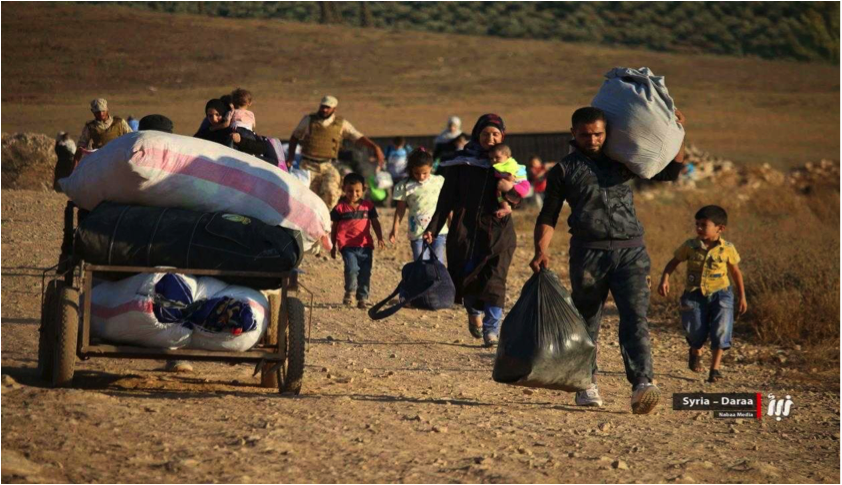Challenges of the Decision to Return to the (New Syria) among Syrian Refugees in Jordan
Thousands of Syrians in Jordan have abandoned their status as refugees and voluntarily returned to Syria’s southern Daraa Source: Syria Direct; Google Image
by: Jamal Al-Shalabi, Rasha Istaiteyeh - Hashemite University
The fall of Bashar al-Assad's regime on December 8, 2024, and the rise of Ahmad al-Sharaa to power created an important opportunity for refugees to return to their country, and the hopes of some Syrian refugees to fulfill. However, United Nations indicates that the number of those who returned does not exceed 65,000 out of 650,000 refugees data . Opinion polls confirmed that 72% of refugees do not consider returning under the current circumstances, which necessitates understanding the underlying reasons for this.
This piece aims to identify the real reasons that prevent Syrian refugees from returning to their country after the political system change and the emergence of a new political authority that seeks to build a "New Syria" for all segments of the politically, religiously, and ethnically conflicted society. Among the reasons highlighted are: the political and military fragility of the new regime, security threats and instability, economic difficulties, and the psychological dimensions.
Reasons for hesitation
The first reason relates to the fragility and weakness of the new regime. The "absence of legitimacy" of the new political system represents a major dilemma, especially since it stems from a religious jihadist background condemned internationally. Despite the political openness toward this regime from major and regional countries, especially the United States of America, the "new regime" will continue to face many challenges and difficulties in building this legitimacy and translating it practically on the ground. This reality raises questions about its ability to achieve political stability, build a Syria for all, or even continue as a regime in the future. The unstable security situation also plays a significant role in discouraging returns. The minority areas in the western coast, Tartus and Latakia, and the southern regions, Daraa and Sweida, continue to experience a state of security chaos and violent clashes. The presence of armed groups that refuse to "integrate" into the national army exacerbates this instability and increases refugees' fears about returning.
The economic situation after 14 years of conflict between the former regime and the opposition has transformed Syria into a "destroyed mass" of buildings and people. It is a country lacking the "infrastructure" needed for ordinary life, such as hospitals, schools, and roads. Meanwhile, refugees in Jordan have access to essential services and enjoy a near-complete integration into the Jordanian economy, making the prospect of returning to Syria fraught with economic risks.
Lastly, there are psychological and social transformations that make return even less likely. A significant "psychological disconnection" exists between the "new generation" of Syrian refugees born in Jordan—estimated at around 215,000 according to data from the Jordanian Ministry of Interior—and their homeland. They do not know Syria and are only connected to it through passports, family memories, and media stories. This has created a psychological and social "gap," reinforcing their "survival instinct" and their preference to remain in Jordan rather than return to a homeland whose future remains unclear and uncertain.
Possible recommendations
Applying the principle that "if the cause is known, the wonder ceases," the four previous reasons can be addressed, if there is genuine political will—calmly, effectively, and realistically. And then it can be said that "the road is paved" for Syrian refugees to return safely to their country, the "new Syria":
A. Enhancing political stability: This can be achieved by "building political legitimacy" thru openness to the diverse national fabric in Syria to ensure a safe environment for return.
B. Controlling the security situation: enforcing the rule of law and providing security guaranties, especially in areas of tension and sectarian or ethnic conflict.
C. Striving to build the national economy: working on the complete and rapid reconstruction of infrastructure, with a steady increase in domestic and foreign investment, providing significant job opportunities for returning refugees.
D. Addressing the psychological and social aspect: Without providing "support programs" for the psychological and social needs of returning refugees, especially the "new generation" among them, there will be no safe, meaningful, and genuine return for Syrian refugees.
In conclusion, it is clear that the "voluntary return decision" for Syrian refugees in Jordan, as desired by the Jordanian government, is not an easy or feasible matter at the moment. The "path to return" is neither ready nor adequately paved in light of existing political, economic, security, and psychological reasons that require considerable effort and time. However, political realism suggests that if these reasons are addressed and the proposed recommendations are implemented, it is possible to achieve the "Safe Return Project" for Syrian refugees and ensure its success.
Contact:
Rasha Istaiteyeh, Hashemite University, Jordan | ristaiteyeh@hu.edu.jo

